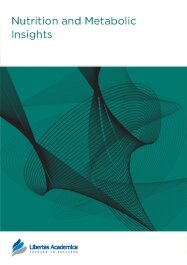

Publication Date: 22 Jul 2013
Type: Original Research
Journal: Nutrition and Metabolic Insights
Citation: Nutrition and Metabolic Insights 2013:6 35-42
doi: 10.4137/NMI.S12215

Background: Coffee has been reported to be rich in antioxidants, with both acute and chronic consumption leading to enhanced blood antioxidant capacity. High-fat feeding is known to result in excess production of reactive oxygen and nitrogen species, promoting a condition of postprandial oxidative stress.
Methods: We tested the hypothesis that coffee intake following a high-fat meal would attenuate the typical increase in blood oxidative stress during the acute postprandial period. On 3 different occasions, 16 men and women consumed a high-fat milk shake followed by either 16 ounces of caffeinated or decaffeinated coffee or bottled water. Blood samples were collected before and at 2 and 4 hours following intake of the milk shake and analyzed for triglycerides (TAG), malondialdehyde (MDA), hydrogen peroxide (H2O2), and Trolox equivalent antioxidant capacity (TEAC).
Results: Values for TAG and MDA (P , 0.001), as well as for H2O2 (P , 0.001), increased significantly following milk shake consumption, with values higher at 4 hours compared with 2 hours post consumption for TAG and H2O2 (P , 0.05). TEAC was unaffected by the milk shake consumption. Coffee had no impact on TAG, MDA, H2O2, or TEAC, with no condition or interaction effects noted for any variable (P . 0.05).
Conclusions: Acute coffee consumption following a high-fat milk shake has no impact on postprandial oxidative stress.
PDF (691.47 KB PDF FORMAT)
RIS citation (ENDNOTE, REFERENCE MANAGER, PROCITE, REFWORKS)
BibTex citation (BIBDESK, LATEX)
XML
PMC HTML

I have thoroughly enjoyed my participation as a reviewer for Nutrition and Metabolic Insights. I am impressed by the quality of manuscripts submitted for consideration from all over the world. The online review submission process is very well organized and simple to use.
Facebook Google+ Twitter
Pinterest Tumblr YouTube